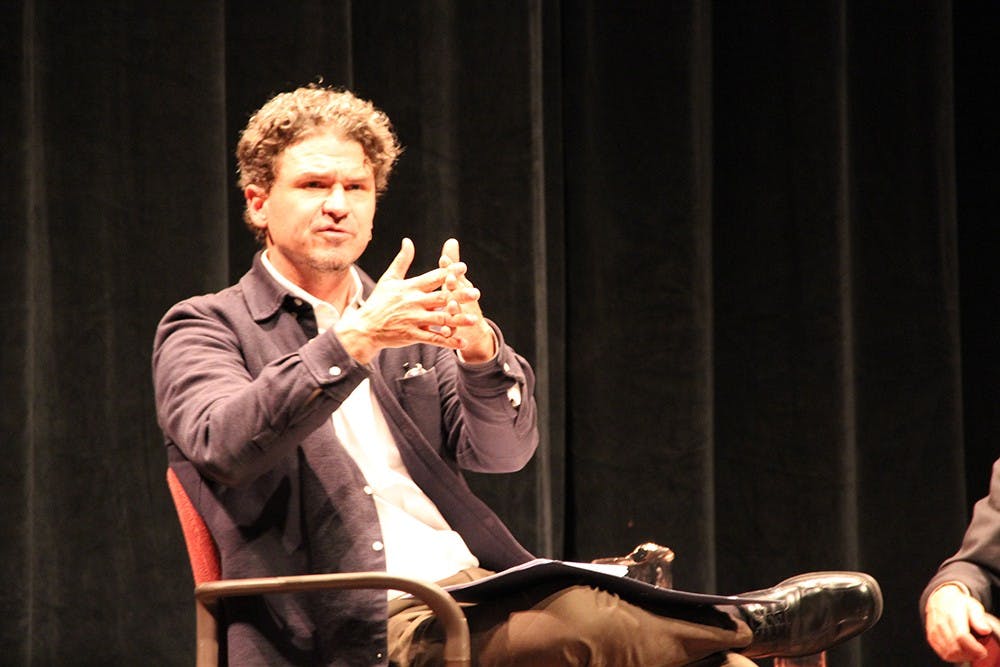Then, imagine that Eggers’ friend waited in the bushes, with spy goggles and a camouflage outfit, just to know exactly when Eggers would open his letter.
On Wednesday night, while speaking onstage at the IU Auditorium, Eggers said this scenario is what he thinks of when friends keep track of exactly when he receives and reads emails.
“Our right to know something has superseded anyone else’s right to privacy,” Eggers said at his IU appearance Wednesday evening. “He’s reached into my computer, into my home and gotten information without my consent.”
This conversation with Eggers was sponsored by the Media School, the Kelley School of Business Common Read Program, the Kelley Institute for Social Impact and the College Arts and Humanities Institute.
Under the lights, Eggers sat across from his friend, Dan Moulthrop. In 2005, Moulthrop, Eggers and Ninive Clements Calegari co-authored the book, “Teachers Have it Easy: The Big and Small Salaries of America’s Teachers.”
This book was not, however, the focus of Wednesday’s talk. Instead, the discussion centered on Eggers’ 2013 novel, “The Circle,” which all freshmen entering the business school in 2015 were required to read as a part of this year’s Common Read Program.
“The Common Read Program gives students the opportunity to connect with other students, faculty and staff around a topic outside the typical classroom discussions through reading, critical thinking and personal development,” said Walton Muyumba, an associate professor of English, when introducing Eggers.
The basic plot of “The Circle” is that one technology company acquires a monopoly over the Internet.Under this company’s control, the Internet, especially social media, becomes so pervasive in everyone’s life that it is inescapable and the company has absolute power over everyone.
In many ways, the novel is a commentary on Internet culture today.
“It’s created a neediness that’s new and a hyper-sensitivity that’s new,” Eggers said of the Internet. “It’s created an expectation of constant affirmation that may be distracting.”
Eggers said the topic is important for students to consider because they are the ones who will be able to shape the ways in which technology use is monitored in the future.
He said one of the “original sins” of the Internet is that it was created with the idea that all Internet has to be free. This makes it difficult for people to protect their ideas, privacy and livelihoods.
“We have medical ethics, legal ethics, business ethics,” Eggers said. “Most industries are heavily regulated. Why wouldn’t there be this same field of digital ethics and the same sorts of regulations?”
Privacy was a central theme of the conversation. Eggers said when a person logs onto Dictionary.com, 235 trackers attach themselves to that person’s computer and proceed to monitor all of their Internet activity.
“But it also tells you how to pronounce the word,” Moulthrop joked, as though it could be a fair trade.
Though the novel has been described as science fiction, Eggers said the world within the book is becoming more similar to reality each day.
Filming is currently underway for the on-screen adaptation of the book, which will star Emma Watson and Tom Hanks.
Eggers said because technology has advanced so rapidly since he first wrote the novel, he’s had to further exaggerate some of the technology displayed in the film.
“A lot of the stuff that I made up and thought would never come to pass, some of it has,” he said.
As examples of this, he mentioned the world having access to Hilary Clinton’s emails, the small cameras that can be placed anywhere by anyone and the upcoming “dislike” button on Facebook.
“It was like the forging of the UN or something,” Eggers said of the discussion surrounding the “dislike” button’s release.
Eggers did also mention the benefits of social media, noting that it is very important to the work of his nonprofit, 826 Valencia.
He encouraged the audience to find a balance between technology and real life and be conscientious Internet users.
“I feel like in this era, when it’s so easy to measure anything, we have to take steps back,” he said. “We have to take a breath and know how painful it is to be on the other side of one of these reductive measurements that says, ‘You’re a six.’ The dehumanizing aspect of this is what concerns me.”






